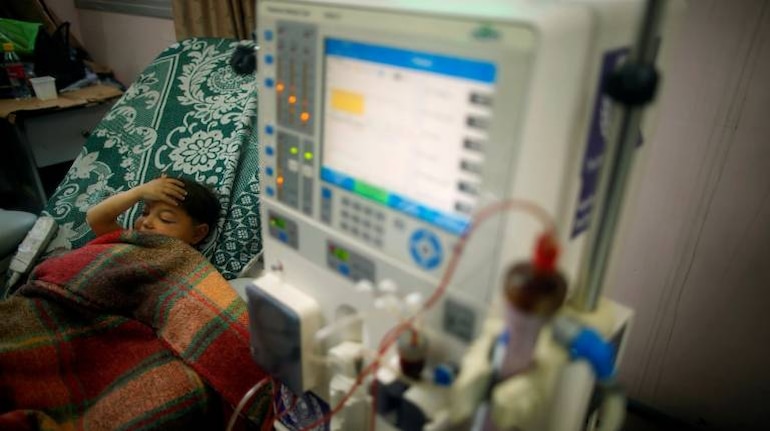
Viswanath Pilla
Moneycontrol News
The health ministry is believed to be working on a policy to regulate medical diagnostics tests in the country, which will include capping prices.
According to sources, the ministry is working with government policy think tank Niti Aayog to prepare a list of diagnostic tests for which prices will be regulated.
The list will be based on the World Health Organization's (WHO's) list of essential diagnostic tests.
Earlier this week, WHO released a list of 113 diagnostic tests out of which 58 were listed for detection and diagnosis of a wide range of common conditions, providing an essential package that can form the basis for screening and management of patients.
The remaining 55 tests are designed for detection, diagnosis, and monitoring of “priority” diseases such as HIV, tuberculosis, malaria, hepatitis B and C, human papillomavirus and syphilis.
“The government for some time is contemplating to regulate medical diagnostics, the idea is to standardise the quality of these tests, make them affordable and accessible,” said an official at the ministry who didn’t want to be named.
The government has already commenced its efforts in this direction by capping prices of dengue tests at Rs 600 during the outbreak of the seasonal fever.
Comprehensive healthcare
The government's urgency assumes significance as it goes in tow with Prime Minister Narendra Modi’s healthcare scheme Ayushman Bharat.
The government plans to set up 1.5 lakh health and wellness centres under the plan to provide comprehensive health care, including for non-communicable diseases, maternal and child healthcare. These centres will provide free essential drugs and diagnostic services.
Another programme, the National Health Protection Scheme (NHPS), called 'Modi Care' proposes to cover 10 crore poor and vulnerable families with coverage up to Rs 5 lakh per family per year for secondary and tertiary care hospitalisation.
If the NHPS is implemented, it will be the world’s largest government-funded healthcare programme.
Before rolling out the two schemes, the government wants to ensure that price anomalies in the diagnostics market are standardised.
Impact on diagnostics market
The government's proposed policy will have wider ramification on the $4 billion Indian diagnostics market.
Organised retail chains such as Dr Lal Pathlabs, SRL, Thyrocare among others cover 15 percent of the country's diagnostics market, while hospitals have 37 percent, and the rest are run by unorganised standalone labs. Hospitals that earn between 15-20 percent of their revenues from diagnostics will be impacted following the implementation of the scheme.
"We will have to wait and watch on how this turns out," said Om Manchanda, Whole Time Director and Chief Executive Officer of Dr Lal PathLabs.
"We are a service company, and servicing costs are location-based - servicing cost that I have in Connaught place in Delhi is very different from the service cost in Bihar, then my quality standards, we are College of American Pathology and National Accreditation Board for Testing and Calibration Laboratories accredited laboratories. We bring in technology and deliver services at a customer's doorstep. How do you cap that," Manchanda added.
He went on to state that he supports the need for implementation of Clinical Establishment Act - that regulates laboratories.
"While the proposal is laudable, we would also like to point out to the gaps that exist between the cost of medical equipment, instruments and patent procurements that have a bearing in the determination of market price," said Arunima Patel, Managing Director of Mumbai-based iGenetic Diagnostics.
"There are also newer procedures and clinical methods for certain chronic diseases that are still evolving and technologies continuously innovating. We hope that features of the policy will also touch upon these issues," Patel added.
"Unlike the hospital sector, where certain hospitals have the advantage of claiming premium prices based on superior doctors, the diagnostic sector especially for the basic tests, has an inherent limitation of having standardized services," Edelweiss had said about the diagnostics sector last year.
"With incremental competition expected in future, the diagnostic market will get commoditised and larger players will be forced to reduce prices. Therefore, for players like Dr Lal Pathlabs and Thyrocare growth is likely to slow down.
"With price controls already implemented in drugs, the government has been increasingly focusing on introducing similar measures for diagnostics and equipment. Such regulatory pricing pressures are bound to increase in the future and put incremental pressure on revenue and EBITDA margin," Edelweiss added.
Discover the latest business news, Sensex, and Nifty updates. Obtain Personal Finance insights, tax queries, and expert opinions on Moneycontrol or download the Moneycontrol App to stay updated!